International Youth Conference – held by
Ramakrishna Mission Vivekananda Memorial, Vadodara, Gujarat, India
August 10 & 11, 2013
(I) Report of Saturday, August 10, 2013 convention:
August 10th was the first day of our International Youth Conference here in Baroda. The program began in MS University’s grand CC Mehta Auditorium.

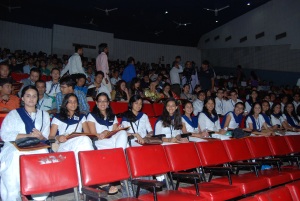
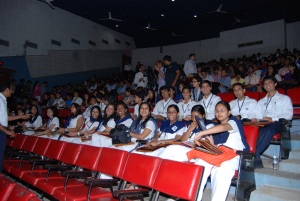

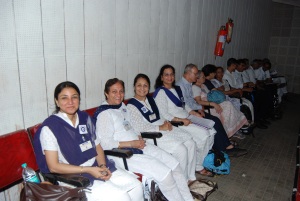


In a packed hall of over 570 people, the conference began with the gathering of chief guests and many swamis including Swami Suhitananda, the General Secretary of the Ramakrishna Math and Ramakrishna Mission in Belur Math. Swami Atmashraddhananda, Editor of The Vedanta kesari, Chennai, was the Anchor of the program.
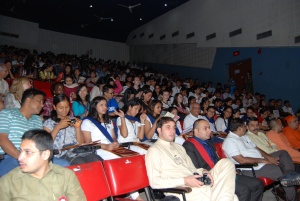


The program started with the recitation of Vedic Chanting recited by Swamis of Ramakrishna Mission. Shri Nitinbhai Patel, the Finance Minister of Gujarat, was the chief guest of the event. He inaugurated the program with lighting us a lamp. He talked about the greatness of Swami Vivekanand and said that after 150 years his message is still relevant today and will be relevant after 1000 years. Then, Swami Suhitanandaji gave his special message on this occasion.

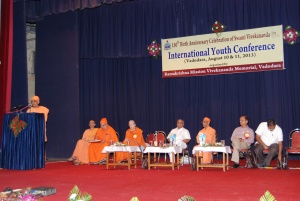
This was followed by a video recorded message of the Director General of UNESCO who discussed the shared values of Swamiji and other global institutions such as UNESCO.
The next event of the day was one of the highlights, a speech by Former President of India Dr. Abdul Kalam.
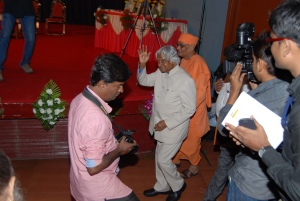
Dr. Kalam’s speech was invigorating and inspiring. He discussed the youth as an influential power source. He mentioned Swamiji’s emphasis on service to man. Dr. Kalam closed his speech by telling the youth how they can be unique and transformative. He mentioned four qualities of uniqueness – a great aim, a constant acquisition of knowledge, hard work, and perseverance. This lecture was followed by a series of questions by the audience.






Once Dr. Kalam’s session was completed, we headed out for our lunch.

After the break, there was an audio-visual presentation that centered on Swamiji’s life. This was followed by an enthusiastic speech by Shri Bhagyesh Jha, the Secretary of the Department of Youth, Sports, and Cultural Activities in Gujarat. He emphasized Swamiji’s teaching on seeking the good in adversity.
Next was Swami Atmarupananda, a Swamiji who has worked in several California centers and is now in Belur Math reorganizing the Complete Works of Swami Vivekananda. His speech focused on the youth and it’s uniqueness. He said that youth have an idealism and energy that need to be harnessed and that with these qualities we have a great responsibility to serve the world.
Following, was a speech by Pr. Shuddhatmaprana who had joined us in our travels of Gujarat. She focused her story on the parable of the lion who was raised by sheep, and emphasized that we are all like the lion – we have greatness within us and therefore must realize that potential by not being blind followers.
After, was a speech by Ms. Arunima Sinha. Sinha is a 26 year-old woman who became the first female amputee to climb to the peak of Mt. Everest. Her story of her struggles in losing her leg, rehabilitating, and persevering to achieve her goal was truly inspiring. She mentioned that her drive to succeed came from Swami Nikhileswarananda of Baroda who met with her and introduced her to the work of Swamiji. He even raised funds to get her an extra artificial leg for her expedition. In fact, when Arunima reached the top of Everest, she placed both the Indian flag along with a picture of Swamiji, Thakur, and Holy Mother. Arunima’s speech was received with a standing ovation and much applause. Then, Dr. Jeetendra Adhia, the Mind Trainer of Ahmedabad gave a lecture demonstration.
Once the speeches of the session were complete, we had a break for teatime.
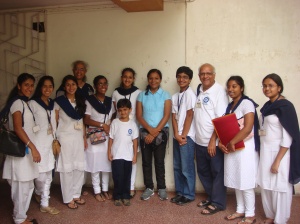
Teatime was followed by the evening’s cultural programs. The program started with a unique glow in the dark puppet show of Swamiji’s life and then a short drama on Swamiji at the Parliament of Religions.
After this was our cultural program from Vivekananda Vidyapith. Radha Dhar was emcee of the program.

We started with the Shanti Mantra.
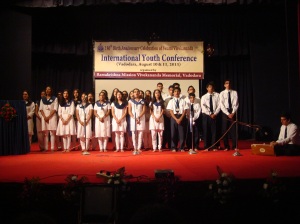

Following this were several recitations. Radhika Shukla recited Swamiji’s poem, “To an Early Violet.” Neer Trivedi discussed a passage of Swamiji on the harmony of religions – recalling the story of the frog from the sea and the frog from the well. Srujanee Pradhan then spoke on Swamiji’s idea of true education.



After the recitations, we sang the bhajan “Jaya Vivekananda Sanyasi Veer” and the dhoon “Jaya Vivekananda”. All of the students sang joyfully and many audience members, including the swamis, even joined in by clapping their hands to the dhoon.

Following the bhajan was another recitation by Rishi, “Failures” by Swami Vivekananda.

Nilesh Shukla then gave a speech on Vidyapith and his reflections on his experiences.

We closed the presentation with the singing of the song “Arise! Awake!….”

All Vidyapith students received gifts from Pr. Shuddhatmaprana.





The participants were: Ansh Balar, Eesha Bhave, Asthaa Chaturvedi, Dhara Bhuptani, Rishi Dhar, Radha Dhar, Arundhati Johri, Sonali Mehta, Alak Mehta, Nishank Mehta, Bhargavi Nambi, Bindi Parikh, Priya Parikh, Ronak Parikh, Nisha Parikh, Srujanee Pradhan, Kanchan Railkar, Utsav Rana, Aneri Rokad, Nikita Rokad, Chintal Shah, Apurva Shah, Sneha Shah, Smit Shah, Radhika Shukla, Neer Trivedi, Angi Vora, Nilesh Shukla, Trupti Parikh, Jyoti Shah, Siddhant Pradhan, Anish Trivedi, Kunal Trivedi, Shyam Mehta.
The evening program concluded with several items from the Indian youth. Shrimati Vanita Thakkar sang couple of songs based on Swami Vivekananda’s ideas. There was a cultural dance item along with a poem that was performed.
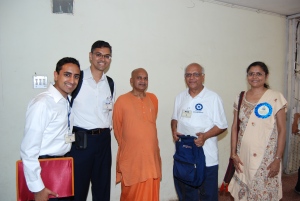
The program was over around 9:00 p.m. All were hungry. Nilesh and Apexa had invited all to a Pizza Place. All were happy about the excellent Vidyapith’s cultural program students had presented today and seeing that it was very well received by the audience. The Pizza Dinner was most appropriate celebration. We all went to the Pizza Place and had a great time. After dinner all went to the Royal Orchid Central hotel and rested well. There was a great relief in the minds of all.








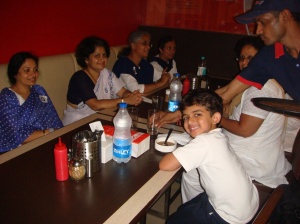
(2) Report of Sunday, August 11, 2013 convention:
On the 11th we began the second and final day of our conference. The day began with a videoconference with Shri Sam Pitroda, the current chairman of the National Innovation Council, who is heralded as the “father of IT” in India. Pitroda discussed the need for infrastructure development in India, echoing Swamiji’s words that we must address first change ourselves before seeking change in society. He emphasized that the youth needs to become visionary. The youth must seek to create jobs and solutions. They must do so by emphasizing execution rather than simply discussing the problems and blaming others. After his talk, Pitroda answered several questions from youth delegates including four from our very own Vidyapith students. The following were the questions from Vidyapith’s students to Sam Pitroda:
Smit Shah’s Question: Many people say that fast-paced technology has caused our minds to atrophy. How do we instead use modern technology to harness our mind’s power and improve our ability to focus?


Ronak Parikh’s Question: How do we infuse Swamiji’s teachings in our decision-making and management styles at profit-seeking organizations/businesses?
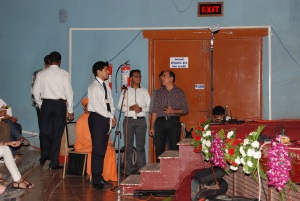
Asthaa Chaturvedi’s Question: “In my experience there’s no substitute for personal human connection. How can we use telecommunications to enhance this human connection rather than dilute it?”

Eesha Bhave’s Question: With fast paced changes in technology, how can we use that to empower women in India and in other places?

After the Pitroda session was a speech by Shri G. Narayana, a management trainer who discussed problem solving through various stories from our Hindu mythology.
Following this was an aerodynamic show and tea break. Next was a question/answer session with the Swamijis and Pr. Shuddhatmaprana who were in attendance at the conference. Several students asked questions.
The following was Kanchan Railkar’s Question to Swami Atmarupananda. How can we spread Swami Vivekananda’s message to other youth in America if they turn a blind eye to Hinduism? In response to the question Swami Atmarupananda discussed the difference between self-centeredness and self-esteem. He mentioned that the problem is how we think of ourselves – we must not thinking of “me and them” but “us”.
Then Swami Sarvasthananda discussed how it is difficult to be good and that is where Swami Vivekananda’s emphasis on strength – physical, mental, and spiritual – is necessary. Swami Nikhileswarananda discussed the concepts of social work and spiritual practice, mentioning that social work is in fact spiritual practice. Pr Shuddhatmaprana spoke on anger, suggesting that we must understand that anger is the “other side of the coin of desire”. She stated that when insulted what is affected is our ego and in the end the use of anger is negligible.
After our insightful session with the Swamis, we had our lunch break.
Following lunch were the youth presentations of the day. Our own students Ronak Parikh talked about “Youth Power for Social Transformation” and Eesha Bhave talked on “Success Mantras for Youth leadership.”

The following is a summary of Ronak Parikh’s presentation: ‘Swami Vivekananda has often said that there is significant power and influence in our youth that can lead to social transformation. But what exactly is the nature of this power and how can it be realized? The youth is a period of our lives marked by dynamism – energy, fresh perspective, and perseverance. This dynamism is the power source of transformation. Swami Vivekananda prescribes several steps in making use of this power. As in the scientific method, Swamiji asks us to understand a problem and the roots of that problem before addressing it. Once we have done our research and due diligence, we should completely immerse ourselves in the issue that we are seeking to address. But Swamiji does not suggest that we directly attempt to address social problems. He explains that we must begin by changing ourselves and we must do so by strengthening 3 qualities: purity, perseverance, and patience. Only with these can we change ourselves and in turn initiate social transformation – whether it be in our global society, in our country, in our neighborhood, or even in our home.
Eesha talked about some of Swamiji’s most important values that youth leaders must abide by, including the ideas of having a dynamic personality, love for all, and being spiritually grounded among others.
There were also sincere and thought-provoking presentations by delegates from South Africa, Bhutan, Russia, Hyderabad, and Vadodara. The excitement and energy during these presentations could be felt in the auditorium itself. The delegates presented on ideas from their personal lives, from teachings of Swamiji, from organizations they have worked with, etc.
The Youth Presentations was followed by Shri Jayant Chakravarty’s talk and presentation who is a popular mind trainer of Kolkata.

Next was a speech by Smt. Jayanti Ravi, the Commissioner of Technical Education of Gujarat and a visiting professor at Harvard. She spoke on social enterprising for poverty alleviation through a program she is starting in villages across India.

After there were speakers including Dr. Bikas Sanyal, a vice-chairman of UNESCO, and Dr. Balsubramaniam, the founder of the Swami Vivekananda Youth Movement. These were followed by a speech of Major General Dilawar Singh.



Then, Swami Nikhileswarananda said that he was very happy to see a large group from USA, especially delegates of Vivekananda Vidyapith, USA, (about 60 people) participated in this convention. He said that actually, when he visited Vivekananda Vidyapith in June 2010 and met the students there, at that time he got this idea of having an ‘International Youth Convention.’ Then, few months ago, he called Mahendrabhai (Uncle) and asked if he can bring students and alumni from the Vidyapith. Mahendrabhai said ‘yes, he can’ and then all the work for the International Youth convention started.
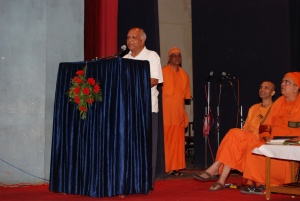
Swami Nikhileswaranandaji asked Dr. Mahendra Jani (Uncle) to share his thoughts on this occasion. Uncle said that Swami Nikhileswaranandaji gave credit to him, but because of Swami’s tremendous energy and ability such a big convention was possible which hosted several eminent speakers. Uncle said where else one can find the spirit of Swami Vivekananda other than in the lives and service of Swamis of Ramakrishna Mission? These Swamis had renounced their lives to follow Swami Vivekananda’s teachings. Uncle mentioned that when people go far away from India, then they realize the importance of the great Indian culture more. He said one should not assume that all people who go to USA think about only money and luxury. There are many Indians residing in USA who carve to know and practice the values taught by Upanishads and Bhagavad Gita. They want their children to get such character building education based on these values. All these students of Vivekananda Vidyapith present here are a few examples of this fact. Uncle then congratulated Swami Nikhileswarananda for successfully holding this International Youth Convention.
Following Uncle, couple of selected students presented their feedbacks. One of them was Vidyapith’s Alak Mehta.


He said, “Namaste. On behalf of the Vivekananda Vidyapith from the United States, I would first like to thank revered Swami Nikhileswaranandaji for organizing this conference, and giving us the opportunity to attend despite the limited space. We are especially grateful to have been able to present a few things to all of you last night as a part of the cultural program. It has been a tremendous experience to meet and connect with fellow devotees of Swami Vivekananda from all over India and around the world. We are honored to have heard and interacted with such a diverse group of eminent speakers, leaders, and swamis. This conference truly reinforced the universality and practicality of Swamiji’s teachings – Service, Harmony of Religions, Upliftment of the poor, Sacrifice, Perseverance, Oneness, Acceptance, and more. These are important values that all of us can practice and incorporate in our lives. Such is the character-building, value-based mission of Vivekananda Vidyapith. As the Director General of UNESCO pointed out in her recorded message, Swami Vivekananda was a humanist who sought to bring out the potential excellence and divinity in everyone, irrespective of class, race, or nationality. As revered Pravrajika Suddhatmapranaji stated in her speech, we youth need to bring out the lion of divinity lying within us. I sincerely thank everyone at this conference for reminding me that with a strong character, accepting personality, and a purpose, each of us has the power to do great things and transform the world. Thank you.”
The conference closed with energetic remarks by Swami Nikhileswarananda who encouraged the delegates to keep the passion they had gained during the conference alive. He mentioned that like a cell phone, a charge will last only for a temporary time. We need to recharge, and in this case recharge with the reading of Swami Vivekananda’s teachings.
Each of the delegates received a wonderful laptop bag with the logo of the Ramakrishna Mission. The bags were packed with books, calendars and CDs about Swami Vivekananda and his teachings. Swami Nikhileswarananda gifted the Vidyapith students with some of his lectures that they also were able to put in the bags. Vidyapith teachers and parents also received these mementos so they could also remember and listen to Swami Vivekananda’s teachings!


The program was over around 6:00 p.m. Most of the students, teachers, and parents were checking out from the hotel. Only Nilesha’s family, Prasad’s family and Uncle remained in the Royal Orchid Hotel on August 11th night. In the morning they were having a breakfast together. At that time Rajan Shukla (the youngest in the group; 6 years old) asked Uncle with little hesitance and shyness, “Uncle! When do we have our next trip?” We had a great laugh. We were all feeling a great relief that by the grace of God, the trip and the program went very well. Now, let us relax. But, Rajan expressed how much he had enjoyed the whole India trip. Such programs do not happen often. Just by a divine plan it had happened and we all had a wonderful time thinking of Swami Vivekananda and his impact in the universe.
Thanks to Ronak for writing the major part of this report, Radha Dhar, Eesha Bhave, and Alak to add the needed material to it, and Nisha Parikh to edit all the bulletins. This is the last bulletin of the trip and IYC.